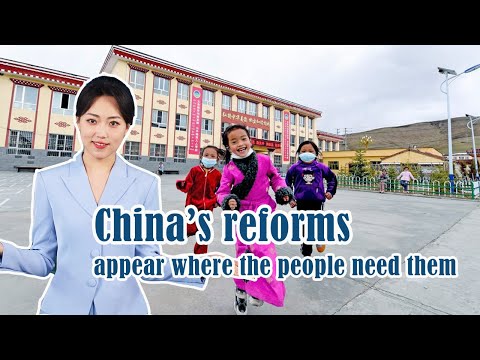BEIJING, July 28, 2024 /PRNewswire/ — A news report from China.org.cn on China’s reform stories:
“I’m now in a beautiful school, and I’m so excited. I will work hard to get into a great university.” Nidong Lamao wrote in her diary.
Nidong Lamao is a girl from a pastoral region on the Qinghai-Xizang Plateau at 4000 meters above sea level. Since childhood, her companions have been snowy mountains, grassland and herds. Due to limited transportation, the farthest place she had ever been to was the county area in the prefecture. Given the harsh climate and infrastructure, it was hard to build decent schools, and travelling to school was also tough for children. With dedicated help from Shanghai, the Golog Xining Ethnic Middle School began construction in 2017, aimed at solving the education challenge for children from farming and pastoral regions. On September 1, 2019, the school officially opened. Up to now, more than a thousand students from the plateau region have been admitted here, and Nidong Lamao is one of them, who enrolled in 2023. At school, extracurricular activities like music learning, robotics club, and museum tours are provided to enrich students’ lives besides the regular school curriculum.
To bridge the gap between urban and rural compulsory education, China initiated an array of education reform measures, including the government-sponsored teaching-major tertiary education plan, setting special teaching positions for rural compulsory education in central and western China, and helping to pair up urban and rural schools as part of a “buddy” scheme. Such measures can help compulsory education to develop in a more balanced way. Official statistics show that last year, China invested nearly 40 billion yuan to improve the weak links in and enhance the capabilities for compulsory education, and 1,736 premium schools were newly established.
When a school paves the way to children’s dreams, a cable lights up the road to development for villagers.
In 1982, a 220-volt cable was connected to Xiaogang Village, Fengyang in Anhui Province. The village, which had relied on kerosene lamps before, finally began to enjoy electricity. “With electricity, we saw more hope,” for those villagers, those days are full of sentiments. However, with more appliances came larger demand that outweighed the supply, causing power outages from time to time. To tackle the problem, the Chinese government quickly acted to upgrade the electricity grids in rural areas. In 1998, reforms in the electricity systems and pricing began; in 2002, the State Grid Corporation of China was founded, which accelerated the reforms of rural areas’ grids. Gradually, the power supply stabilized, prices fell, and the village stepped onto the fast lane of development. In recent years, intelligent agricultural facilities like the smart electric seedling-breeding center and the smart photovoltaic draining and irrigating system were put in place, which enhanced production efficiency and cut costs.
From a cable, a school, to expressways and sea-crossings, to the Beidou Navigation Satellite System and human spaceflight projects, from education, technology, talent cultivation, to economy, livelihoods, systems… one can see the efforts of China’s deepening reforms in all domains, caring for the needs of ordinary households, as well as the major causes significant to the country. The Third Plenary Session of the 20th Central Committee of the Communist Party of China made the decision to further deepening reform comprehensively to advance Chinese Modernization, and more measures in this regard can be expected.
China is always reforming, instead of considering it finished. Even though reforming means tougher tasks and bigger challenges, they will still appear where the people need them
China Mosaic
http://www.china.org.cn/video/node_7230027.htm
A school and a cable: A peek into China‘s people-centered reforms
http://www.china.org.cn/video/2024-07/26/content_117333718.htm
SOURCE China.org.cn


